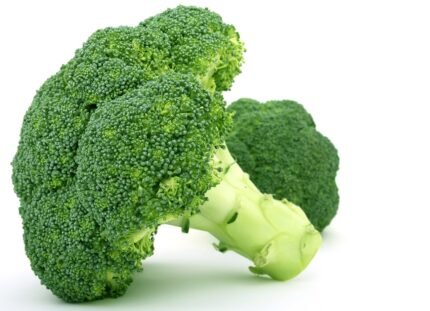Medically reviewed by Dr. Ramesh Gaddam, M.D. — Written by Sumalatha, D.N.H.E
Nutrition of Broccoli
The approximate nutritional values per 100 grams of raw broccoli:
| Nutrient | Amount |
|---|---|
| Calories | 34 kcal |
| Protein | 2.8 g |
| Carbohydrates | 6.6 g |
| Dietary Fiber | 2.6 g |
| Sugars | 1.7 g |
| Fat | 0.4 g |
| Saturated Fat | 0.1 g |
| Monounsaturated Fat | 0.0 g |
| Polyunsaturated Fat | 0.1 g |
| Cholesterol | 0 mg |
| Sodium | 33 mg |
| Potassium | 316 mg |
| Vitamin A | 623 IU |
| Vitamin C | 89.2 mg |
| Calcium | 47 mg |
| Iron | 0.73 mg |
| Vitamin D | 0 IU |
| Vitamin B6 | 0.175 mg |
| Vitamin B12 | 0.00 mcg |
| Magnesium | 21 mg |
These values are approximate and can vary depending on factors such as growing conditions, variety, and freshness. Additionally, cooking methods may affect the nutrient content of broccoli.
Side Effects of Broccoli
While broccoli offers numerous health benefits, consuming it excessively or under certain conditions may lead to some side effects. Here are potential side effects of broccoli consumption:
- Digestive Issues
- Thyroid Interference
- Allergic Reactions
- Blood Thinning
- Kidney Stones
- Interactions with Medications
- Gastroesophageal Reflux (GERD)
Digestive Issues:
Broccoli contains fiber, which can cause digestive discomfort such as bloating, gas, and abdominal cramps, especially if consumed in large quantities or if you’re not accustomed to a high-fiber diet.
Thyroid Interference:
Broccoli is rich in compounds called goitrogens, which can interfere with thyroid function when consumed in large amounts.
Goitrogens can inhibit iodine uptake by the thyroid gland, potentially leading to goiter or hypothyroidism. However, cooking broccoli can help reduce the goitrogenic effects.
Allergic Reactions:
Some individuals may be allergic to broccoli or certain compounds in it, leading to allergic reactions such as skin rash, itching, swelling, or difficulty breathing.
If you experience any allergic symptoms after consuming broccoli, seek medical attention immediately.
Blood Thinning:
Broccoli contains vitamin K, which plays a crucial role in blood clotting.
While vitamin K is essential for normal blood coagulation, individuals taking blood-thinning medications such as warfarin (Coumadin) should monitor their vitamin K intake and maintain consistency to avoid fluctuations in medication effectiveness.
Kidney Stones:
Broccoli is a source of oxalates, compounds that can contribute to the formation of kidney stones in susceptible individuals.
If you have a history of kidney stones or are at risk for developing them, it’s advisable to moderate your intake of high-oxalate foods like broccoli.
Interactions with Medications:
Some components of broccoli, such as sulforaphane, may interact with certain medications.
For example, sulforaphane can induce phase II drug-metabolizing enzymes, potentially affecting the metabolism and effectiveness of medications.
If you’re taking medications regularly, consult your healthcare provider before significantly increasing your broccoli intake.
Gastroesophageal Reflux (GERD):
Broccoli is mildly acidic, which may exacerbate symptoms of GERD in some individuals. Acidic foods can trigger heartburn, acid reflux, or irritation of the esophagus lining.
If you have GERD or experience acid reflux symptoms, consider moderating your intake of acidic foods like broccoli.
While these side effects are possible, they typically occur in specific circumstances, and moderate consumption of broccoli as part of a balanced diet is generally safe for most people.
If you have concerns about consuming broccoli or experience adverse reactions, consult with a healthcare professional for personalized advice.
Medically reviewed by Dr. Ramesh Gaddam, M.D.

General Physician, Diabetologist, and Critical Care Specialist.
Discover more from Health Build-Up
Subscribe to get the latest posts sent to your email.





5 thoughts on “How Long Does Broccoli Last in the Fridge? (Raw & Cooked)”
Comments are closed.